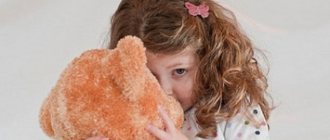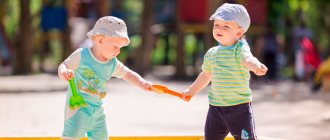Specifics of the development of basic personality traits of a preschool child
The preschool stage of a child’s development is a time period for laying the foundations of a personality and forming its basic qualities.
All personality mechanisms and functional development are laid down precisely in preschool age. Further personal development and its effectiveness depend on them.
The formation of the personal qualities of a preschool child occurs in three main stages:
- The age period of development of children of three to four years of age is the formation and strengthening of the emotional aspects of the personality, the formation of emotional self-regulation. A preschool child forms his activity in any direction on the basis of its emotional component. All the child’s actions are clearly emotionally charged. Without emotional intensity, activity has no meaning - it simply will not take place. During this time period of the child’s emotional development, his emotions expand and deepen. Children begin to develop compassion, mercy, and empathy. Bookmarking them is very important for further personal development. In addition, at this time the formation of the mechanism of emotional anticipation occurs. The child acts on the basis of the emotional image formed in his mind, which characterizes the result of his activity and the reaction of adults to it. Gradually, the development of control over one’s emotions and their manifestation occurs. Initially, adults control the behavior of children, and on the basis of this control, imaginary control is formed in the child’s mind.
- The age period of development of children from four to five years is the stage of moral self-regulation. At this time, the formation of motives for the activities of preschoolers occurs. The most powerful motive for performing any activity is encouragement. The child wants to receive a reward, reward, or at least praise for his work. Punishment also motivates a child. But this is a rather weak motivation. At this time, the formation of the child’s individual motivational system of activity occurs. All the child’s motives begin to be consolidated. Some motives become predominant in the child’s activities. The child learns the moral principles of social behavior, but does not always consciously apply them in practice.
- The age period of development of children of six to seven years is the development of individual personal qualities that a child needs in the business sphere. All these qualities are formed based on the example of adults. Children actively copy the behavior of adults and strive to adopt it in their practical activities. At the same time, children copy both good and bad behavior of adults equally. It all depends on their example.
Are you an expert in this subject area?
We offer to become the author of the Directory Working conditions Note 1
The development of a child’s personality is associated with his knowledge of the world around him, determining his place in it, developing moral principles of behavior and his motivation.
In the course of a child’s personal development, his basic feelings and volitional qualities are formed, which are focused on the formation of effective motives of behavior and the development of sustainable behavior.
Personality and personal development of preschool children
Personality is a complex and multifaceted phenomenon that includes many components. In psychological science there are several generally accepted provisions regarding personality. At the very least, we can talk about four main points:
- Personality is inherent in every person.
- Personality is what distinguishes a person from animals, which do not have a personality.
- Personality is a product of historical development, that is, it arises at a certain stage in the evolution of the human being.
- Personality is an individual, distinctive characteristic of a person, that is, what distinguishes one person from another.
The basis of personality characteristics is self-esteem, which includes attitude towards oneself and knowledge about oneself.
Personality qualities are formed throughout life and depend on the social environment.
By the end of preschool age, self-awareness is formed due to intensive intellectual and personal development; it is usually considered a central new formation. The child begins to talk about himself “I”, recognize himself in the mirror and in photographs at 2.3-3 years. Gradually he begins to realize himself as the cause of the events happening around him and with him. Begins to recognize himself as the subject of his own actions and actions. Understand your needs and desires. He strives to express himself through his own actions (“I myself!”). The crisis of three years is connected with this.
At four years old, a child begins to be interested not just in any phenomenon in itself, but in the causes and consequences of its occurrence. So the main question becomes “why?” The child develops and becomes more physically resilient. This stimulates the development of psychological endurance. Fatigue decreases, the mood background levels out, becomes more stable, and less susceptible to changes. At this age, a peer becomes more significant and interesting. Gender preferences begin to emerge. A big step forward is the development of the ability to form inferences, which is evidence of a separation of thinking from the immediate situation. The dependence of attention on emotional saturation and interest in them remains. But stability and the possibility of arbitrary switching develop. Sensitivity to physical discomfort decreases. Fantasy continues to develop actively. At the age of 4-5 years, the shortcomings of raising a child begin to gradually take root and turn into stable negative personality traits.
In a 5-6 year old child, an adult’s assessments are subject to critical analysis and comparison with their own. Under the influence of these assessments, the child’s idea of the real self and the ideal self are differentiated more clearly. The child strives to share his knowledge and impressions with peers, which contributes to the emergence of cognitive motivation in communication. The development of volition and volitional qualities allows the child to purposefully overcome certain difficulties specific to a preschooler. The subordination of motives also develops. Interest in arithmetic and reading appears. Based on the ability to imagine something, a child can solve simple geometric problems. In addition to the communicative function, the planning function of speech develops, that is, the child learns to consistently and logically organize his actions and talk about it. Self-instruction develops, which helps the child organize his attention in advance on the upcoming activity.
Against the background of emotional dependence on the assessments of an adult, the child develops a desire for recognition, expressed in the desire to receive approval and praise, to confirm his importance. It is necessary to form the habit of moral behavior in a child.
The self-esteem of a child of senior preschool age, 6-7 years old, is sufficient and adequate; it is more likely to be overestimated than underestimated. The child evaluates the result of activity more objectively than behavior.
Visual and figurative thinking with elements of the abstract develops.
Features of the development of self-awareness in preschool age:
- a critical attitude arises towards the assessment of adults and peers;
- peer assessment helps the child evaluate himself;
- the preschooler is aware of his physical capabilities, skills, moral qualities, experiences and some mental processes;
- by the end of preschool age, correct differentiated self-esteem and self-criticism develop;
- the ability to motivate self-esteem develops;
- awareness of oneself in time, personal consciousness appears.
Self-esteem appears in the second half of the period on the basis of an initial purely emotional self-esteem (“I am good”) and a rational assessment of other people’s behavior. The child first acquires the ability to evaluate the actions of other children, and then his own actions, moral qualities and skills.
Gradually, step by step, the child’s personality is formed, and each new shift in the formation of the personality changes the influence of conditions and increases the possibilities for further education. The conditions for personal development are so closely intertwined with development itself that it is almost impossible to separate them. The development of a child's personality includes two sides. One of them is that the child gradually begins to understand the world around him and realizes his place in it; this gives rise to new types of behavioral motives, under the influence of which the child performs certain actions. The other side is the development of feeling and will. They ensure the effectiveness of these motives, the stability of behavior, and its certain independence from changes in external circumstances.
The human “I”, the internal content of the personality, does not arise and is formed from itself, but only in the process of communication with surrounding people, in which certain personal relationships develop. And the nature of the child’s relationships with others largely determines what kind of personal qualities will be formed in him.
Two types of patterns of age-related personality development can be distinguished:
- Psychological patterns of personality development, the source of which is the contradiction between the individual’s need for personalization (the need to be a person) and the objective interest of his reference communities to accept only those manifestations of individuality that correspond to the tasks, norms, values and conditions of development of these communities.
- Patterns of personality development both as a result of entering new groups for him, which become referent for the individual, acting as institutions of his socialization (family, kindergarten, school, work collective, etc.), and as a result of changes in his social position within relatively stable group.
As noted above, the formation and development of personality is influenced by the social environment. We include his parents, teachers (educators), and peers in the social environment of a preschooler.
The main way adults influence the development of children’s personality is through organizing children’s assimilation of moral norms that regulate people’s behavior in society. These norms are acquired by the child under the influence of models and rules of behavior. Models of behavior for children are, first of all, adults themselves - their actions, relationships. The most significant impact on a child is exerted by the behavior of those closest to him. He is inclined to imitate them, adopt their manners, borrow from them their assessment of people, events, and things. However, the matter is not limited to loved ones. A preschool child gets acquainted with the life of adults in many ways - by observing their work, listening to stories, poems, and fairy tales. The model for him is the behavior of those people who evoke the love, respect and approval of others. The behavior of peers who are approved and popular in the children's group can also serve as a model for a child. Finally, the patterns of behavior presented in the action of a fairy-tale character, endowed with certain moral traits, are of no small importance. The decisive moment in the assimilation of patterns of behavior that go beyond the behavior of the people around the child is the assessment given to other adults, children, characters in stories and fairy tales by people to whom the child is attached, whose opinion is most authoritative for him. By presenting demands to children and evaluating their actions, adults thus ensure that children comply with the rules. Gradually, children themselves begin to evaluate their actions based on ideas about what behavior others expect from them.
In childhood, the educational influence of parents and loved ones is one of the decisive factors in the formation of a certain stereotype of behavioral reactions and characterological characteristics. Scientists have identified some types of improper upbringing that can affect a child’s behavior.
Neglect.
For some reason, the child finds himself completely out of sight of his parents. The latter only outwardly supposedly take care of him (feeding, clothing), but basically the child is left to his own devices. They are not interested in his spiritual needs and hobbies; his actions and behavior remain uncontrolled. Formally carried out education should also be classified as this type. Parents show interest in the child only as a matter of form.
Overprotection.
Excessive guardianship with continuous prohibitions, instructions, moralizing, control over every step of the child has an extremely adverse effect on the formation of his strong-willed and characterological qualities. It deprives him of initiative and independence, suppresses his sense of responsibility and duty.
“Idol of the family” or “ mimosa
education.”
Unlike overprotection, there is a desire to protect the child from the slightest difficulties and all sorts of unpleasant responsibilities. An atmosphere of admiration, exaggeration and praise of his abilities and talents, often imaginary, is created around the child. All the child’s wishes are unconditionally fulfilled, he is the center of attention of the family. Such hyper-attention contributes to the formation of egocentrism and interferes with the development of systematic work skills and independence in solving assigned tasks.
Emotional rejection, Cinderella-type education.
This type of upbringing is typical for families where the mother or father is burdened by a child who constantly feels this, especially if there is another child in the family who receives more attention, warmth and care from the parents. Emotional rejection contributes to the development of increased vulnerability and sensitivity, resentment and secrecy.
Abusive relationships.
Cruel treatment with harsh reprisals for minor offenses and disobedience causes fear of parents and bitterness in the child.
Parents strive to give their child the broadest education possible, to develop his real and, more often than not, imaginary abilities. In addition to kindergarten, the child is involved in music, a foreign language, sports, and studies in a preschool gymnasium. He is constantly busy, in a hurry to get somewhere, and is constantly required to know. He simply cannot master the planned program due to his age and intellectual capabilities. At the same time, parents are increasingly demanding, believing that they are pawning the future well-being of the child. In such cases, the child is deprived of the opportunity to participate in children's games and communicate with peers. He develops a feeling of hopelessness and at the same time grows protest against such a regime. Excessive workload contributes to the development of increased fatigue of the nervous system and anxiety.
Thus, a personality is a person, as a subject of interpersonal and social relations, who has reached a level of development that allows him to be considered a bearer of consciousness and self-awareness, capable of independent activity.
Personality develops throughout life:
- In the crisis of three years, when the child says “I myself.”
- When a child develops psychological stability, the child is interested in everything, and he asks the question “Why?”
- Development of arbitrariness and strong-willed qualities.
- The child evaluates the result of activity more objectively than behavior.
Teacher
Sukhorukova Svetlana Aleksandrovna
Game as the main method of personality development of a preschooler
The development of a child is carried out in the course of his upbringing and the various activities that he performs. Among them the following main ones can be distinguished:
- Game activity.
- Household work. This includes a variety of household operations that can be performed by a child.
- Activities between an adult and a child. Teachers and parents organize special activities, exercises and tasks for children to complete, focused on their learning and development.
- Maintaining a daily routine. The child performs certain actions during the day that reflect routine moments: washing in the morning, brushing teeth, eating, sleeping.
Development of personal characteristics in communication
Communication with adults and peers creates favorable conditions for the development of the personality of preschool children.
Most of all, children are busy with role-playing games, which involve following the rules prescribed by the plot. Before starting the game, preschoolers assign roles and agree on what rules they will follow.
This teaches diplomacy in communication, develops initiative, but at the same time the ability to coordinate one’s opinion with the opinion of others. The preschooler gets used to taking into account the interests of his peer, and in general perceiving him as a person, and not a mechanical partner in play activities.
In addition to business, moral qualities are laid in communication with peers. The preschooler shows sympathy if another is in pain and seeks to justify a friend if he is threatened with punishment.
The adults with whom the preschooler interacts show him an example of evaluating everything that happens around him. They approve, condemn, simply express their attitude. A child, like a sponge, absorbs such statements and forms his own value guidelines. For example, the only child in the family, who has all the toys at his disposal, will ask permission from a peer to take his car or doll only if adults explain to him.
It is impossible to foresee all situations that are important to teach a child. Therefore, the more a child is included in communication, the more fully his experience and system of moral guidelines will accumulate.
The development of a preschooler’s personality in social terms occurs due to the formation of a system of value orientations and norms of behavior. Internal positions and attitudes are formed. An older preschooler is already guessing how other people will treat him if he does this or that, acts this way or that way.
The Negative Impact of Negative Evaluation
Communication is unthinkable without evaluation. And the statements of adults also help the child form ideas about his capabilities. “You can’t jump off this ladder yet, I’ll help you,” “You can’t take a car from a boy. You will offend him,” “You can’t say that, it’s a bad word.” Such statements include prohibitions and denials, but they indicate important limitations to the preschooler.
Unfortunately, adults use many other types of negative assessments that emphasize the child’s inability and shortcomings. They can be divided into two types:
- Negative assessment of what was done (badly folded the toys, drew them unsightly, spilled the soup again).
- A predictive statement of a negative nature (don’t take it, otherwise you’ll break it; you won’t be able to; you’ll fall again).
Negative assessments of any kind inhibit the activity of a preschooler, distort the child’s opinion about his capabilities, harm the formation of self-esteem and limit personal development.
Cognitive processes of a preschooler
Preschoolers quickly develop all mental processes. A distinctive feature of all cognitive processes in preschool age is their acquisition of voluntariness.
In early preschool age (3-4 years), perception is closely related to the child’s emotions, and the more positive feelings and vivid impressions the child experiences when exposed to some stimulus, the more accurate the perception will be. But already at an older age (5-7 years), perception becomes not just a reaction to a stimulus, but a tool for understanding the world around us. Visual perception is especially developed in preschoolers.
Attention and memory retain their involuntary nature, but by the end of the period their volition develops. By the age of 5, the stability of attention and its volume increase. Moreover, it has been established that stability of attention is related to the character of the child. In calm children it is 2 times higher than in emotional ones.
The most important mental function affecting the development of a preschooler is memory. A child is able to remember a lot of different information, but only when he is interested, and this happens during the game. No special memorization techniques will work.
The development of a preschooler's thinking goes through several stages. At the beginning, the child develops visual-effective thinking, then - by the middle of preschool age - it turns into visual-figurative thinking, and at the end verbal-logical thinking begins to form.
These psychological features of the development of preschool children, and in particular the features of thinking, must be taken into account when communicating with a child. For example, a 4-5 year old child asks when mom will return home. You answer that she will come home after work. And a couple of minutes later the child asks the same question. No, he is not joking with you and he heard your answer well. Simply, due to the specifics of children's thinking, he did not understand it.
The words “after”, “then” belong to the category of time (past, present, future), and this relates to verbal-logical thinking. And the child operates visually and effectively. Therefore, so that the child understands you, list after what actions and events the mother will appear at home. For example: “You and I will go for a walk now, then we will eat, watch a cartoon, it will become dark outside the window, and then mom will come.”
Formation of the personality of a preschooler using the example of parents
Since a person’s personality is formed from the first days of his life, everything that surrounds him influences this process, especially his closest circle - his parents. Depending on the atmosphere in the child’s family, his concept of the world and how he should be is formed. In prosperous families, where kindness and mutual understanding reign, where loved ones support each other, listen, and do not lie, the child grows up to be a fairly honest and open person who believes that all people are just as positive. And in kindergarten, such children are immediately noticeable - they help everyone, try to please the teachers, are responsible for their mistakes and can admit their guilt.
Well, in those families that cannot be called prosperous (an alcoholic father, a wandering mother, constant screams, scandals), the formation of a preschooler’s personality can slow down, because the baby does not feel cared for, he does not develop in society, no one helps him. Such a child becomes a hunted animal, wary and afraid of everything in the world. As a result, an unfriendly personality is formed who, almost from the cradle, gets used to fighting for his life in all known ways. Don’t be surprised if such a family grows up to be a liar, a hypocrite, a coward and a greedy person. Of course, there are exceptions to the rules, but only if at least someone in the family pays attention to the child, for example, if the father drinks, and the mother tries with all her might to protect the child from this and convinces the baby that the father is a bad example for imitation.
The child learns the type of relationships that have developed in his family, and already going to kindergarten, he can show himself as a friendly person or as a frightened, cruel person. The development of a preschooler’s personality occurs not only in those moments when you say or forbid something to the child, but also in every second when you are nearby. The child sees and notices everything - what your mood is, what you are happy about and what makes you angry, how you communicate with your parents, with friends, how you speak about them within the walls of the house. While the child is small, he has nowhere else to get information about the world except from you, and that is why children are so similar to their parents - they learn from their example.
Phases of personality development of a child under 3 years of age
- Child adaptation
From the first weeks of life, the baby tries to adapt to the world around him - he masters the simplest skills (eating, moving his arms and legs, crawling, walking). The child slowly begins to master the language and begins to distinguish himself from the rest of the environment.
- Individualization of the child
The baby already understands that he is an individual (although, of course, the meaning of this word is not yet available to him). In the second phase of development, we can notice how the child constantly repeats “I”, “Mine”, “My mother”. This is how children emphasize that they are different from those around them. And it is important at this stage of personality formation to highlight the child’s name, call him affectionately, and come up with diminutive forms of his name. The child’s dignity should be affirmed through his name, so instead of “go away, my good boy,” you should say to the child “Vanyusha did well,” “Anya did the best!” After all, our name already contains a personality, and the child must understand that with good behavior he is called affectionately, but with bad behavior he may not be called by name at all, and this will be an offensive, but instructive lesson.
- Integration
During the integration phase, the child is able to control his own behavior and knows how to control others. With proper upbringing, children begin to understand that not only their own whims are important, but also the desires of those around them - they also need to be taken into account. Adults need to be obeyed and obeyed, but children understand that adults can be manipulated in different ways - by persuasion or by screaming and hysterics. At this phase, it is very important to cultivate a responsive personality, and not a capricious and selfish one.
Parents must take care not only of satisfying all the child’s needs and whims without exception, but also of moral education. The child must understand that not everything revolves around his person, that there are certain obligations to other people, moral standards. Children are not born selfish, they become so as a result of improper upbringing and excessive blind love of their parents.
Gnomik.ru recommends the company Kholod Group Refrigerator Repair Stinol, low prices! We professionally and promptly repair Stinol refrigerators + any other manufacturers. More than 5 years of experience. Free visit of a specialist and diagnostics!
All repair and maintenance services for refrigeration equipment.
Use promo code: Gnomic.ru
and get a guaranteed 10% discount
We work in Moscow and the region. More details by service area.
Call
Call a technician for free
General characteristics of preschool age
In modern psychology, preschool age is considered to be from 4 to 7 years. The beginning of this period is preceded by a crisis of three years. This is a rather difficult period in the life of parents, since the child shows extreme negativism and strong stubbornness.
It is this crisis that means that the child differentiates, separates from the mother and manifests itself as a separate person with his own opinions and desires. In order for him to successfully pass this stage, parents should under no circumstances humiliate or break the preschooler. You need to show him that he is heard, and he has the right to his experiences, but it is the right of adults to decide.
Having gone through this crisis, the child reaches a new level of relationships with adults. If earlier he was the “navel of the earth”, his mother’s continuation, now he becomes a separate person and a full member of the family. He must follow family rules, and his first responsibilities appear (putting away toys).
The boundaries of the family are revealed, and the child discovers the world around him. At this time, he usually begins to attend kindergarten, where he learns to interact with peers, as well as other adults. This is the first social role.
The desire for independence is an important characteristic of preschool age. The child strives to be an adult, but cannot yet be one. This is what gives rise to role-playing games as an opportunity to “play at being an independent adult.”
The preschooler tries to imitate his elders in everything, from intonation to gestures and behavior. At this age, a child, like a mirror, reflects his parents. This is a great opportunity for them to look at themselves from the outside and think about what they are teaching their children.









